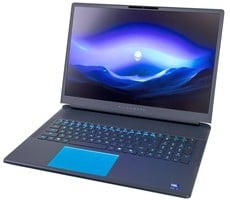Cinebench R11.5 is a 3D rendering performance test based on Cinema 4D from Maxon. Cinema 4D is a 3D rendering and animation suite used by animation houses and producers like Sony Animation and many others. It's very demanding of processor resources and is an excellent gauge of computational throughput. This is a multi-threaded, multi-processor aware benchmark that renders a photorealistic 3D scene (from the viral "No Keyframes" animation by AixSponza). This scene makes use of various algorithms to stress all available processor cores. The rate at which each test system was able to render the entire scene is represented in the graph below, along with results from Cinebench's built-in OpenGL benchmark.
 |
| Cinebench R11.5 |
| 3D Rendering Benchmark |
|
Cinebench stacks the
XPS 13 on the top of our ultrabook benchmark charts, save for the quad-core powered Dell XPS 15 with discrete GeForce graphics. The XPS 13 also handily surpassed the Asus
ZenBook 3, which offered a more middling showing and likely fell victim to thermal throttling within its utlra-thin design's thermal constraints over this longer duration heavy-duty test. The XPS 13 shows no signs of throttle here.
 |
| Futuremark PCMark 8 v2 |
| Full System Benchmark |
|
PCMark 8 v2 is the latest version in Futuremark’s series of popular PC benchmarking tools. It is designed to test the performance of all types of systems, from tablets to desktops. PCMark 8 offers five separate benchmark tests to help consumers find devices that offer the perfect combination of efficiency and performance for their particular use case. This latest version of the suite improves the Home, Creative and Work benchmarks with new tests using popular open source applications for image processing, video editing and spreadsheets. A wide variety of workloads have also been added to the Work benchmark to better reflect the way PCs are used in enterprise environments. Though this is technically a "synthetic" benchmark, PCMark's trace-based workloads utilize real-world software and performance measurements.

PCMark 8 shows a similar view of the XPS 13, as the thin and light machine offers up some of the best numbers we've seen in the sub-5 pound notebook category. It should be noted that this benchmark suite is not only storage subsystem sensitive, but scores are also affected over desktop resolutions. As a result, we have begun testing all machines at a normalized desktop resolution of 1080p, versus native resolution, which on some machines can scale all the way up to
4K. Regardless, in the lighter-duty office productivity, content creation and collaborative workloads of PCMark's Home and Work benchmarks, the ZenBook 3 fairs better, but can't quite keep up with Dell's new XPS 13.









